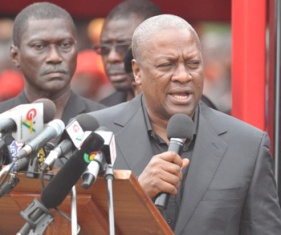- Home - News
- TWI News | TV
- Polls
- Year In Review
- News Archive
- Crime & Punishment
- Politics
- Regional
- Editorial
- Health
- Ghanaians Abroad
- Tabloid
- Africa
- Religion
- Election 2020
- Coronavirus
- News Videos | TV
- Photo Archives
- News Headlines
- Press Release
General News of Wednesday, 27 February 2013
Source: GNA
Mahama directs BPA to resolve labour issues

President John Dramani Mahama has directed the Bui Power Authority, Managers of the Bui Dam project to settle any labour dispute between the company and the local employees with immediate effect.
He entreated the current local employees to also exercise patience as the government was concerned about their plight and would ensure they obtained excellent compensation packages when they were laid-off.
The president gave the directive on Tuesday when he addressed a durbar of chiefs and people of Banda-Ahenkro at Bui, in the Banda District of Brong-Ahafo Region.
Reacting to an appeal by Okokyeredom Kwadwo Sito, Omanhene of Banda-Ahenkro, President Mahama said now that the people had resolved the land litigation and chieftaincy dispute in the area, he would personally ensure that the land compensation package that had been locked up was released to them as soon as possible.
He said the Bui Dam project on completion would bring development to the area and assured both the skilled and the unskilled laid-off employees of jobs.
The President expressed satisfaction with on-going works on the project and was optimistic that the first power supply from the dam would come on as scheduled.
The development of the Bui Hydroelectric Power Project on the Black Volta at the Bui Gorge had been the subject of many studies, including detailed studies by J.S. Zhuk Hydro Project of USSR in 1966, a feasibility study by Snowy Mountains Engineering Corporation (SMEC) of Austria in 1976 and another feasibility study by Coyne et Bollier of France in 1995.
Main construction of the project, which was expected to cost about 622 million dollars, started in 2007 with a concessional loan of 263.5 million dollars from the Chinese Government and a buyer’s credit of 298.5 million dollars from the EXIM Bank in addition to government’s contribution of 60 million dollars.
It was designed primarily for hydro power generation and includes the development of an irrigation scheme for agricultural development and presents an opportunity for enhanced eco-tourism and fisheries.
The project also includes a resettlement and community support programme.










